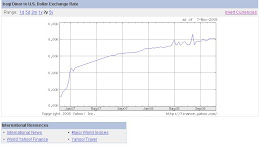Country: Iraq
Project: Dokan and Derbandikhan Emergency Hydropower Project
Sector: Supply and installation of plant and equipment
Product: Derbandikhan HPP Switchyard
Credit No.: 4249-IQ
Project ID: P099059
The Republic of Iraq has received a credit from the International Bank for Reconstruction and Development toward the cost of Dokan and Derbandikhan Emergency Hydropower Project, and it intends to apply part of the proceeds of this credit to payments under the contract for the refurbishment of the Derbandikhan Hydropower Porject (HPP) Switchyard.
Derbandikhan HPP is equipped with three units for a total capacity of 249 MW, is one of the largest power stations in the Kurdistan Region, and is connected to the national power grid. The HPP is part of a multipurpose scheme for power production and irrigation in its area. The Derbandikhan switchyard (132/33/11 kV) is located 300m nearby the Derbandikhan HPP, which is situated about 70km south east of Suleimaniah city, in the Kurdistan Region in Iraq.
The scope of work includes the design, supply, installation, and commissioning of the following main equipment aimed at improving the existing switchyard:
63 MVA, 132/33/11 kV power transformer;
33 kV and 11 kV equipment;
Auxiliary transformer and grounding transformer;
High, medium and low voltage cables;
400V AC distribution system and marshalling kiosks;
Lighting and socket outlet systems;
Batteries;
Battery charges;
DC distribution system;
Protection system;
Miscellaneous works;
General construction features;
Portable fire fighting (extinguishers);
63 MVA Transformers fire fighting system;
Air-conditioning and ventilation system (HVAC).
Bidders’ qualifications
To be qualified for the award of the contract, bidders shall possess the following requirements:
i) Specific experience in the supply and installation of the equipment for high voltage switchyards of power plants acquired in the last five years, either directly or through nominated sub-contractors. This includes at least two supply and installation contracts, each including at least one transformer at 132 kV or above, of a minimum size of 40 MVA.
(ii) A total turnover for the last three years (2005 to 2007) greater than 15 million US dollars.
(iii) The policy of the Bidder as well as those of all its subcontractors shall not forbid either the contractor or its subcontractors to provide expatriated personnel to work in Iraq, and therefore the contractor and its subcontractors shall be in the position to actually provide the expatriated personnel needed for the erection and commissioning of the equipment.
(iv) Absence of any non-performance of a contract in the last three years prior to the deadline for application submission, based on all information on fully settled disputes or litigation.
(v) Not being under execution of a Bid-Securing Declaration in Iraq.
(vi) All pending litigation against the contractor shall in total not represent more than 10%, (ten percent) of the contractor’s net worth.
(vii) Current soundness of the contractor’s financial position and its prospective long term profitability, and capacity to have a cash flow amount of one million US dollars equivalent, both proved by the audited balance sheets of the last three years (2005 to 2007) or, if such audited balance sheets are not required by the law of the contractor’s country, by other financial statements acceptable to the Kurdistan Regional Government (KRG) Ministry of Electricity.
Bidders may associate to enhance their qualifications.
Bidding will be conducted through the international competitive bidding procedures specified in the World Bank’s Guidelines: Procurement under IBRD Loans and IDA Credits, and is open to all bidders from eligible source countries as defined in the Guidelines.
Bidding documents
Interested eligible bidders may obtain further information from the KRG Ministry of
Electricity (MOE Address 1) or from ELC Electroconsult, at the addresses given below, and inspect the bidding documents at the same addresses from 08.00 to 15.00 hours, Sunday to Thursday for MOE and from 09.00 to 17.00 hours, Monday to Friday for ELC Electroconsult.
A complete set of bidding documents in English may be purchased by interested bidders on the submission of a written application to one of the addresses below and upon payment of a nonrefundable fee of 800 US dollars. The documents are available from 13 October 2008 and can be collected from the addresses given below or will be sent by regular mail on request. The documents may also be sent using international courier upon receiving advance payment of 50 US dollars for the courier fee. The method of payment will be by cash. Payment may also be carried out by certified cheque, or prior deposit into the bank accounts as follows:
For payment to the Ministry of Electricity:
By certified check made payable to Dokan and Derbandikhan Hydropower Project (PMT), or
Deposit into the following bank account: Kurdistan Regional Trade Bank, Suleimaniah, Iraq. Account number 463
For payment to ELC Electroconsult:
By certified check made payable to ELC Electroconsult S.p.A., or
Deposit into the following bank account:
Banco di Desio e della Brianza
BIC: BDBDIT22
IBAN: IT94K0344056400000078300009:
Bids must be delivered to the Ministry of Electricity address below (MOE Address 2) at or before 15 January 2009, 12:00 noon.
All bids must be accompanied by a bid security of two hundred thousand US dollars (200,000 USD) or an equivalent amount in a freely convertible currency. Late bids will be rejected.
Bids will be opened in the presence of the bidders’ representatives who choose to attend in the Ministry of Electricity at the address below (MOE Address 3) five minutes after the deadline for submission of bids.
MOE Address 1:
General Directorate of Electricity of Suleimaniah
Fatih Saeed Salih
Salm Street, Suleimaniah, Republic of Iraq
Phone: 00964 770 1580336
E-mail: fatihsalih02@yahoo.com
MOE Address 2
Commercial Directorate
General Directorate of the Diwan
Ministry of Electricity, Kurdistan Regional Government
Brayaty, 60 Meter Street
Erbil, Kurdistan Region
Iraq
Attention:
Mr. Hoshyar A. Siwaily, Minister for Electricity
MOE Address 3
General Directorate of the Diwan
Brayaty, 60 Meter Street
Erbil, Kurdistan Region
Iraq
ELC Electroconsult address:
ELC Electroconsult
Via 1° Maggio 41, 20021 Baranzate (Milano), Italy
Phone: (+39) 02383351
Facsimile: (+39) 0238335353
E-mail: federico.ciampitti@elc-electroconsult.com
Attention :
Federico Ciampitti
(KRG)



